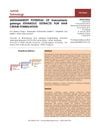 3 citations,
December 2003 in “University of California Press eBooks”
3 citations,
December 2003 in “University of California Press eBooks” Media images promote unrealistic beauty standards, affecting body image and eating disorders globally.
[object Object]  4 citations,
January 1974 in “The BMJ”
4 citations,
January 1974 in “The BMJ” All medications can cause skin rashes, often without a clear cause, and better tests are needed to identify these drug-related skin issues.
 September 2022 in “Research Square (Research Square)”
September 2022 in “Research Square (Research Square)” Caffeic acid helps protect rats from the harmful effects of acrylamide.
 153 citations,
October 2012 in “Skin Pharmacology and Physiology”
153 citations,
October 2012 in “Skin Pharmacology and Physiology” Caffeine in cosmetics may reduce cellulite, protect skin, and stimulate hair growth, but more research is needed on its use and effects.
 54 citations,
November 1998 in “Archives of dermatology”
54 citations,
November 1998 in “Archives of dermatology” Avoiding certain nutrients and drugs may help manage pemphigus.
 40 citations,
January 2010 in “Indian Journal of Dermatology, Venereology and Leprology”
40 citations,
January 2010 in “Indian Journal of Dermatology, Venereology and Leprology” Certain diets can affect skin conditions, but more research is needed to understand these relationships fully.
 39 citations,
June 2017 in “Journal of Applied Research on Medicinal and Aromatic Plants”
39 citations,
June 2017 in “Journal of Applied Research on Medicinal and Aromatic Plants” Plant-based ingredients are effective and safe for modern skincare products.
 4 citations,
February 2018 in “Jurnal teknologi”
4 citations,
February 2018 in “Jurnal teknologi” Kaempferia galanga extract could be a good ingredient for anti-dandruff hair cream.
 2 citations,
November 2019 in “Cancer reports”
2 citations,
November 2019 in “Cancer reports” The Wnt signaling pathway is not a major factor in the development of keratoacanthoma, a type of skin tumor.
 August 2023 in “International journal of research in Ayurveda and pharmacy”
August 2023 in “International journal of research in Ayurveda and pharmacy” Ayurveda can prevent hair fall and promote regrowth using herbs and lifestyle changes.

 January 2002 in “Journal of Toxicology-cutaneous and Ocular Toxicology”
January 2002 in “Journal of Toxicology-cutaneous and Ocular Toxicology” Botanical extracts are increasingly important in cosmetics and drugs for their effectiveness and safety, backed by traditional use and scientific evidence.
 January 2017 in “Acta dermato-venereologica”
January 2017 in “Acta dermato-venereologica” The congress showed that psychological therapy can help skin condition patients, social media affects acne stigma, education improves atopic dermatitis, and patient satisfaction in dermatology is high, especially with good doctor engagement.
 466 citations,
August 2004 in “Journal of the American Academy of Dermatology”
466 citations,
August 2004 in “Journal of the American Academy of Dermatology” Rosacea is a skin condition with unclear causes, classified into four subtypes.
 120 citations,
April 2009 in “Food Chemistry”
120 citations,
April 2009 in “Food Chemistry” Hibiscus plant extracts may have health benefits like lowering blood pressure and protecting the heart.
 98 citations,
October 2012 in “Dermatologic Clinics”
98 citations,
October 2012 in “Dermatologic Clinics” Eating the right nutrients can improve hair health, but taking extra supplements usually doesn't help unless you have a deficiency.
 77 citations,
July 2020 in “Journal of the European Academy of Dermatology and Venereology”
77 citations,
July 2020 in “Journal of the European Academy of Dermatology and Venereology” Environmental factors, hormones, nutrition, and stress all significantly affect skin health and aging.
 76 citations,
February 2015 in “Industrial Crops and Products”
76 citations,
February 2015 in “Industrial Crops and Products” Researchers found over 40 compounds in Bituminaria bituminosa, including many flavonoids and some with potential for medical and hair care uses.
 67 citations,
June 2018 in “Engineering in Life Sciences”
67 citations,
June 2018 in “Engineering in Life Sciences” Plant cell culture is a promising method for creating sustainable and high-quality cosmetic ingredients.
 48 citations,
July 1996 in “Human & Experimental Toxicology”
48 citations,
July 1996 in “Human & Experimental Toxicology” Human enzymes can detoxify harmful substances but might also increase their cancer risk.
 45 citations,
January 2020 in “International Journal of Molecular Sciences”
45 citations,
January 2020 in “International Journal of Molecular Sciences” Some natural compounds may help overcome drug resistance in certain cancers, but more research is needed.
 29 citations,
May 1998 in “Bulletin of the American College of Nurse-Midwifery”
29 citations,
May 1998 in “Bulletin of the American College of Nurse-Midwifery” The document concludes that menopause should be seen as a natural part of aging and managed with personalized care and informed choices.
 28 citations,
September 2013 in “Expert Opinion on Therapeutic Patents”
28 citations,
September 2013 in “Expert Opinion on Therapeutic Patents” New resveratrol-related compounds show promise for treating various health issues but need more research for clinical use.
[object Object]  16 citations,
September 2018 in “Journal of Ethnopharmacology”
16 citations,
September 2018 in “Journal of Ethnopharmacology” Plant-based remedies may treat hair loss by reducing inflammation and improving insulin resistance.
 15 citations,
January 2016 in “Przeglad Menopauzalny”
15 citations,
January 2016 in “Przeglad Menopauzalny” Eating a balanced diet with specific nutrients is important for menopausal women to manage hair loss.
 15 citations,
December 2013
15 citations,
December 2013 Men with more vanadium in their blood and who drink less soy milk are more likely to have hair loss.
 14 citations,
April 2019 in “Saudi pharmaceutical journal”
14 citations,
April 2019 in “Saudi pharmaceutical journal” Microparticles help caffeic acid stay longer in hair follicles for better treatment of folliculitis.
 14 citations,
January 1985 in “International Journal of Dermatology”
14 citations,
January 1985 in “International Journal of Dermatology” The cause of alopecia areata was unknown, and while various treatments existed, no best treatment was agreed upon.
 10 citations,
January 2010 in “PubMed”
10 citations,
January 2010 in “PubMed” Adjuvants, diet changes, and laser therapy may improve male pattern hair loss.
 8 citations,
July 2008 in “Facial Plastic Surgery Clinics of North America”
8 citations,
July 2008 in “Facial Plastic Surgery Clinics of North America” More men are getting non-surgical cosmetic treatments due to increased income and social acceptance, with less invasive options being preferred.






























